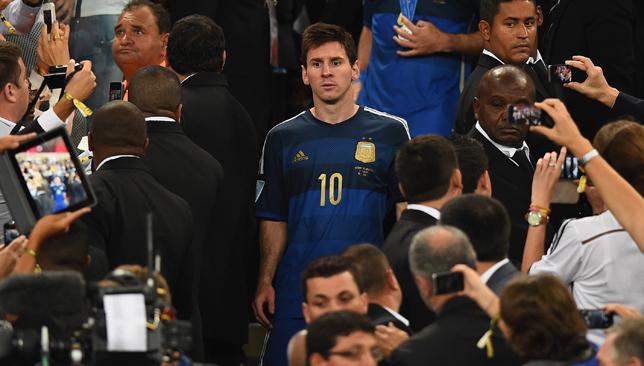
As Lionel Messi shuffled up to collect the Golden Ball award for the 2014 FIFA World Cup’s finest player, it was not just the Argentine who should have been embarrassed.
At Messi’s moment of greatest disappointment he was shamelessly paraded in front of a global audience measured in the hundreds of millions. It was painfully obvious he wanted to be anywhere else, wishing to escape into the Rio de Janeiro night rather than collect a prize his shamed facial expression showed he did not want.
This is no attack on Messi. The 27-year-old performed superbly by anyone’s standards but his otherworldy own in this tournament.
The player who possesses four Ballon d’Or titles was on show in the earlier stages, memorably striking a spine-tingling late curled winner against Iran in the group stages and setting up Angel Di Maria to score the only goal of the tight last-16 clash against Switzerland with a trademark burst only he is capable of producing.
His disappearing acts in the dour semi-final win against the Dutch and crushing final loss to Germany would have seen him ruled out by any organisation that prioritises credibility.
FIFA have not fitted that label for a long time. Under president Sepp Blatter, its reputation as the guardians of football has taken a long-lasting buffeting.
– GALLERY: Germany's joy, Messi's misery & Goetze's goal – the World Cup Final in pictures
With only the pretence of democratic accountability, a self-serving pursuit of the bottom line ahead of the greater good has seemingly been undertaken by an assembly that thrives on cronyism.
In Brazil, the collective power of victors Germany has dominated the discussion at the expense of their incredible individual merits.
They undoubtedly possess a number of the sport’s finest stars – all more worthy of the Golden Ball.
Thomas Muller again made playing in a World Cup look effortless, striking five goals. Captain Philipp Lahm proved he is top draw at fullback or defensive midfield. Manuel Neuer expanded defending his net to encompassing his own half, continuing his reimagination of the role of goalkeeper.
Yet more candidates can be found away from Die Mannschaft. Colombia’s James Rodriguez was the breakout star, his six goals making him top scorer – including the strike of the tournament with his volley against Uruguay – but not enough to come away with the greatest individual prize.
The Netherlands’ Arjen Robben was also a constant threat in every match he played, the experienced talisman of a callow side that memorably overachieved in their run to third place.
What all these names lack is a headline-grabbing power that transcends football. Messi is that man, his face adorning millions of billboards and taking up innumerous minutes during advertising breaks throughout the tournament.
It is hard to think of any other reason for why the Barcelona forward was summoned by Blatter to make the walk up the Maracana steps.
Every football fan was tuned in at that moment in anticipation of seeing deserved champions Germany rewarded for a month of sterling achievement.
Instead, they got an unwitting puppet used for seemingly everything other than his achievements in Brazil.